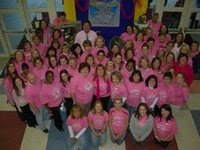 Dear Tammi,
Dear Tammi, Thank you for your sweet words. I absolutely love my job, and I love to laugh! I remember when I was in elementary school. I felt sooooo lost most of the time. I didn't get what was going on. But when a teacher cracked a joke or was funny, I seemed to "get it." Since then, I have always wanted to find a way to reach children that seem as lost as I was back then. Laughter helps everyone feel comfortable. If I can help even one student feel capable of learning something new by making them laugh, what could be better? I know all children can learn. My challenge is to figure out how. By creating relationships with my students they are able to feel safe, are engaged, and ready to learn. They are willing to try much harder because they know I believe in them 100 percent! I absolutely relish hearing a child's laughter. A good belly laugh gets the juices flowing. Learning then becomes easy.
Your friend,
Sherrie Anderson
Your friend,
Sherrie Anderson








